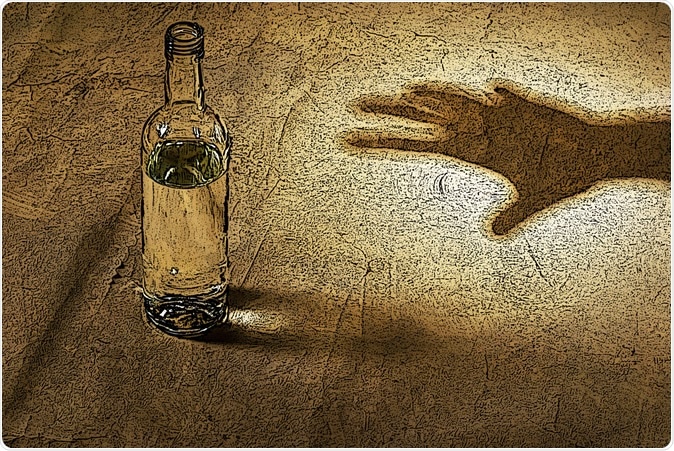There are several studies looking at the effects of alcohol intake on the brain. A new study adds to the existing knowledge. The large study with around 11,651 participants from United Kingdom shows that each gram of alcohol consumed could lead to around a week of ageing of the brain.
The new study titled, “Association of relative brain age with tobacco smoking, alcohol consumption, and genetic variants” was published in the latest issue of the journal Scientific Reports this week.

Image Credit: Vaclav Mach / Shutterstock
For this study the team of researchers gathered data from the UK Biobank on participants aged between 45 and 81 years and were of European ancestry. The Biobank is the national health register for UK. Consumption of alcohol was studied and those who consumed alcohol every day or on most days of the week had around 0.4 years or 5 months of additional brain ageing compared to those who did not. This meant that drinking regularly led to an accelerated brain ageing explained the researchers.
The team explained that each unit of alcohol contains 8 grams of alcohol. A single shot of spirit is a single unit and a pint of strong beer or a large glass of wine is considered to be three units.
Senior researchers Arthur Toga, professor at the University of South California explained that the actually way in which alcohol ages the brain and affects the quality of life is unknown. However, he added, the effects are clinically significant. He said, “The 0.4 years of difference was statistically significant. We suggest that daily or almost daily alcohol consumption can be detrimental to the brain.”
For this study the team looked at daily alcohol use by the participants as well as the Relative Brain Age seen in MRI scans of the brain. There are two measures of the brain, wrote the researchers. One of these is the Predicted brain age or PBA. PBA is defined as the ageing of the brain that is based on its anatomical features and is calculated based on brain anatomical measurements of the entire brain. The second measure developed by these researchers is the RBA or relative brain age. They wrote that this is independent of chronological age or CA of the brain unlike PBA. They explained the RBA, “indicates if a subject’s brain has experienced accelerated or decelerated ageing compared to peers.”
MRI scans could be done on 5193 participants. The age seen in the scans was compared to the actual chronological age and the two parameters were linked to alcohol consumption, explained the researchers. The team found that on MRI there was a significant reduction in the white matter and grey matter of the brain as well as brain volume. These reductions correspond to brain ageing they wrote. The team also looked at smoking habits of the participants. The third association they looked at the genetic variants and their association with brain ageing.
For every gram of alcohol consumed per day, the results showed that the brain aged around a week. Those that drank every day or on most days had the most accelerated brain ageing found the team. Further cigarette smoking was also associated with ageing wrote the researchers. For every pack of cigarettes smoked per day, the brain aged around 11 days (0.03 years), the team found. Those that smoked often or on a regular basis had brains that were 6 to 7 months older than their counter part non-smokers of the same age, wrote the researchers. They also noted that a particular genetic mutation or SNP (single nucleotide polymorphism) located in the MAPT gene on chromosome 17 was associated with accelerated brain ageing.
The authors wrote, “We found that daily or almost daily consumption of tobacco and alcohol were both significantly associated with increased RBA [relative brain age]. Our results suggest that both environmental and genetic factors are associated with structural brain ageing.”
According to the researchers and experts, the easiest way to avoid these adverse brain changes would be avoid smoking and drinking altogether. The genetic predisposition, they added would not be subject to modification but the lifestyle factors could be changed to improve brain health. Kaitlin Casaletto, the first author of the study said that the best way to improve cognition would be avoid these bad habits and start on good habits such as regular exercise. The team wrote in conclusion, “Further studies potentially with even larger sample sizes will be needed to provide a clearer picture of factors associated with brain ageing.”
Journal reference:
Ning, K., Zhao, L., Matloff, W. et al. Association of relative brain age with tobacco smoking, alcohol consumption, and genetic variants. Sci Rep 10, 10 (2020). https://doi.org/10.1038/s41598-019-56089-4